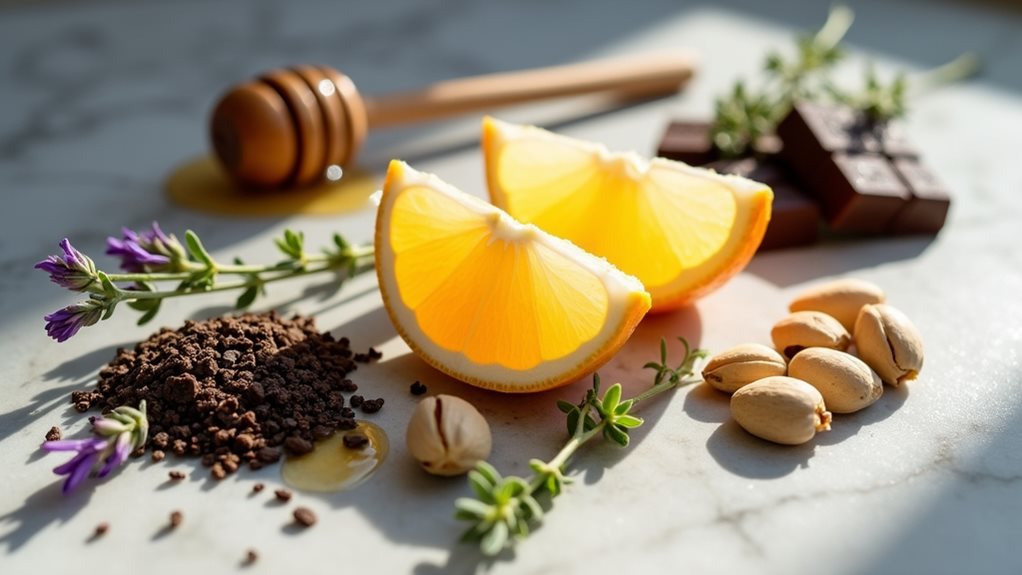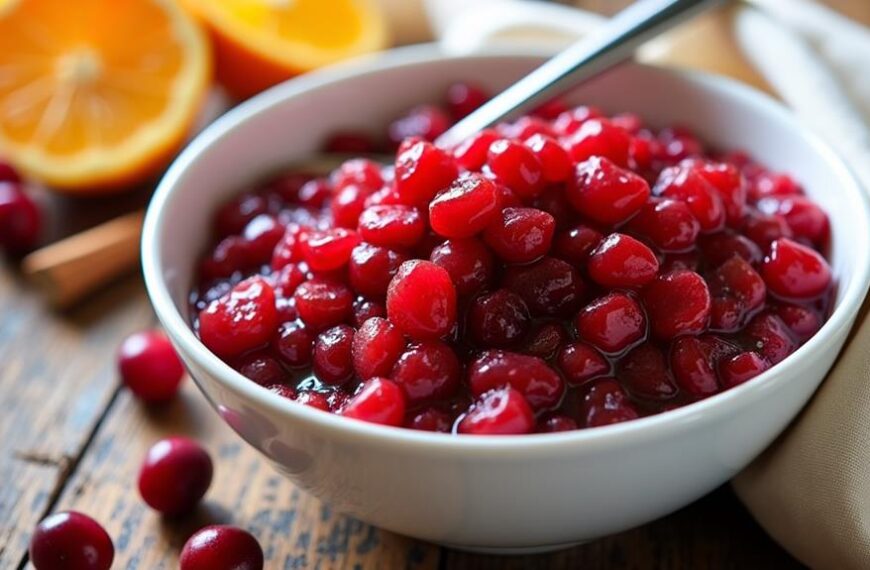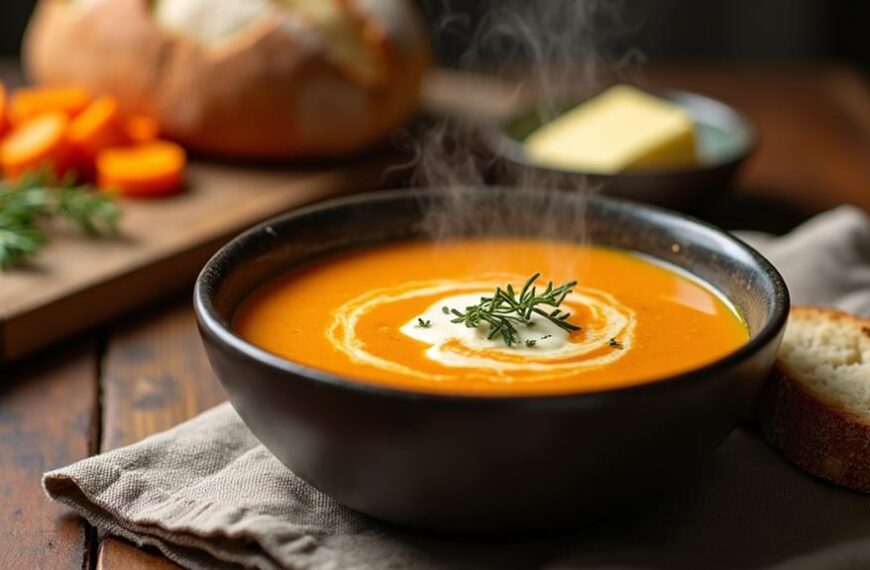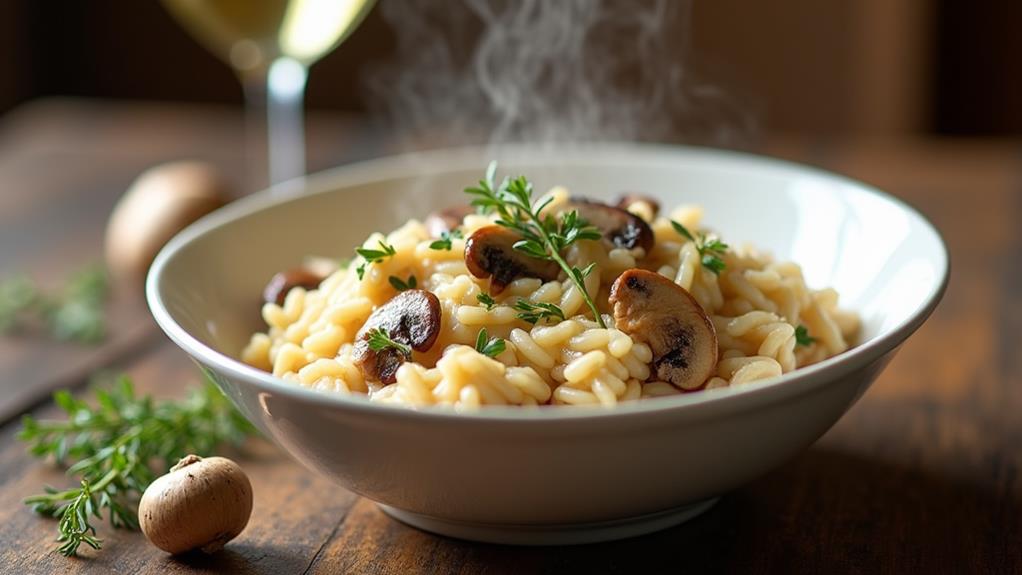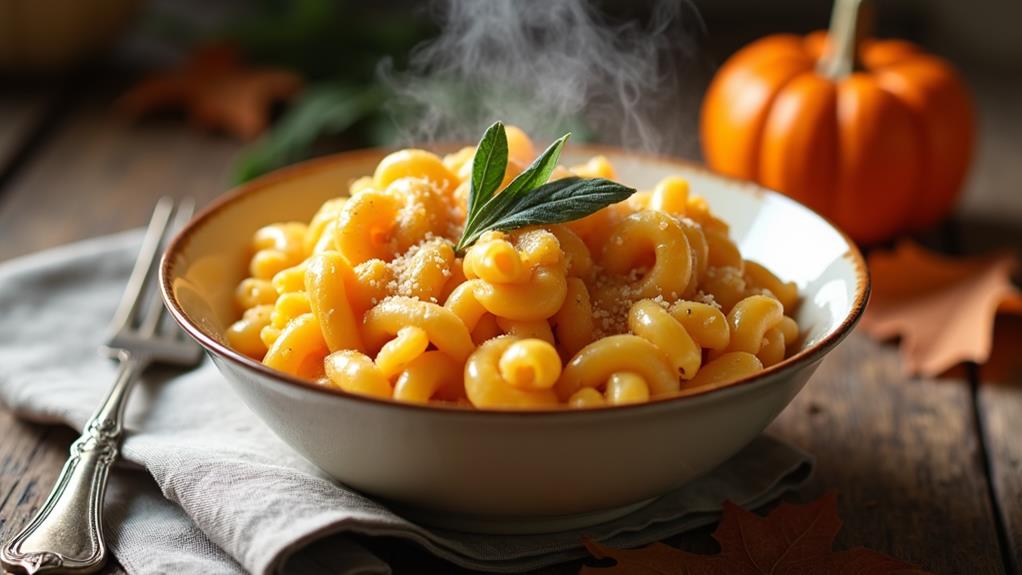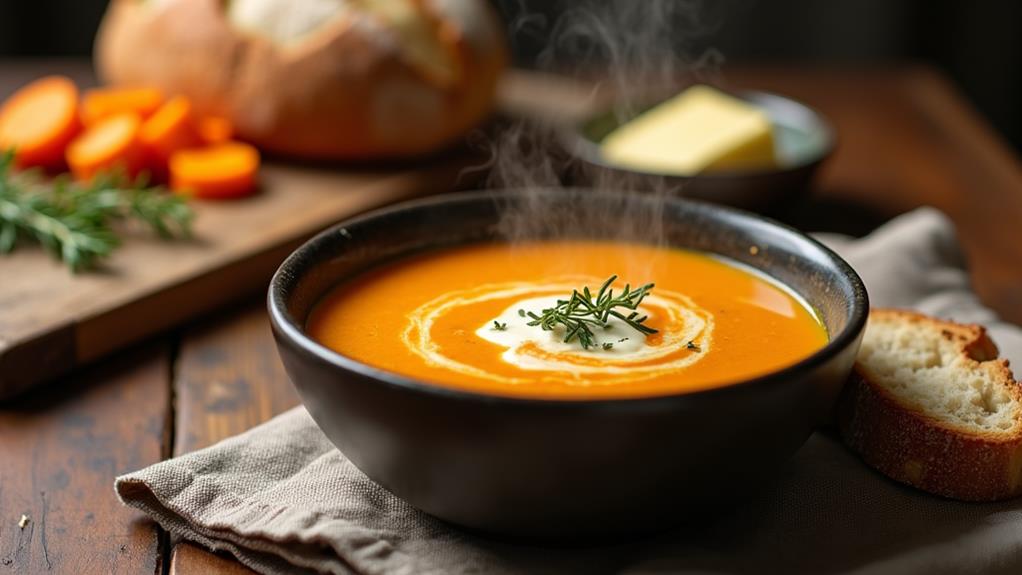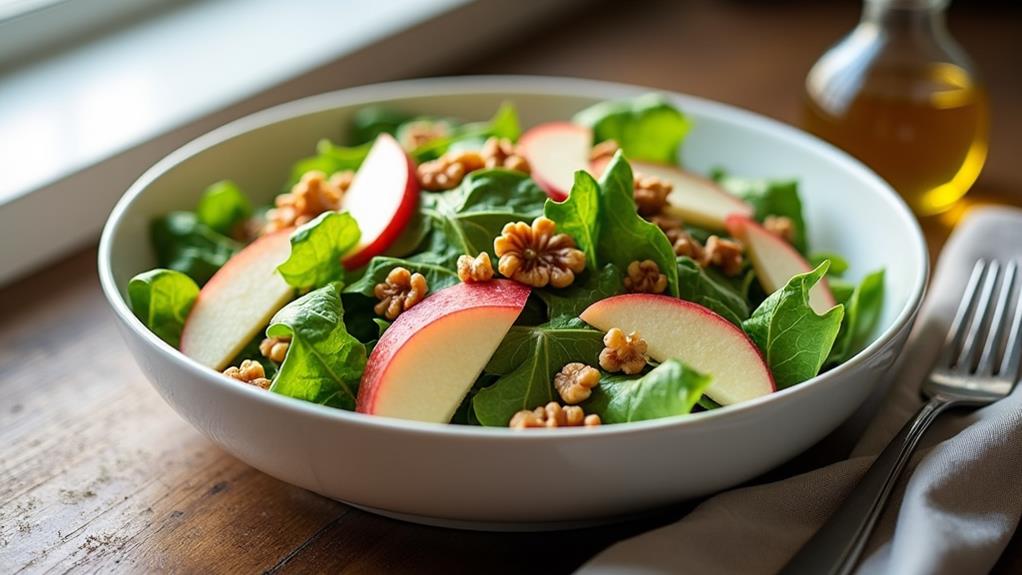Bergamot pairs excellently with other citrus fruits like lemon, grapefruit, and yuzu, creating balanced flavor profiles. Its floral-citrus complexity works wonderfully with warming spices such as cinnamon, cardamom, and ginger. You'll find it enhances both sweet applications (particularly chocolate and vanilla) and savory dishes when used in marinades or dressings. For beverages, bergamot complements gin, vodka, tea blends, and creates sophisticated non-alcoholic options. The following combinations will transform your culinary creations with bergamot's distinctive character.
The Citrus Character: Understanding Bergamot's Flavor Profile
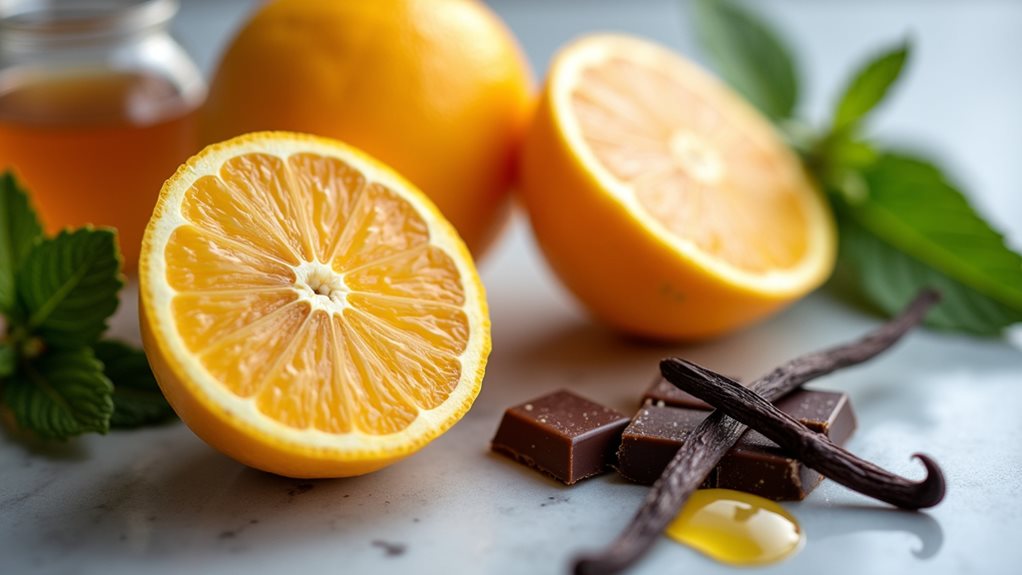
Bergamot, the aromatic citrus fruit that gives Earl Grey tea its distinctive character, offers a complex flavor profile that sets it apart from its citrus cousins. When you taste bergamot, you'll notice its unique combination of bitter citrus notes intertwined with floral and spicy undertones.
Unlike standard lemons or oranges, bergamot delivers a sophisticated cross between these familiar flavors, enhancing its culinary versatility. The fruit's high acidity and distinctive bitterness come from natural compounds like citrus polyphenol. This versatile essence pairs wonderfully with vanilla and lemon in both traditional and modern recipes.
These characteristics, primarily from fruits grown in Calabria, Italy, provide numerous bergamot benefits in cooking. You'll find its essential oils not only flavoring foods but also enriching perfumes and soaps, making bergamot a truly multifaceted ingredient for innovative culinary experiments. For a harmonious scent profile, many perfumers combine bergamot with floral scents like jasmine and rose to create invigorating aromas.
Bergamot and Tea: Beyond Earl Grey
While Earl Grey tea has made bergamot a household name in the tea world, this versatile citrus flavor extends far beyond this classic blend.
You'll find innovative Earl Grey alternatives that explore bergamot's compatibility with different tea bases and complementary ingredients.
Experiment with these bergamot tea variations to discover new flavor dimensions:
- Green and white tea bases – Bergamot pairs beautifully with lighter teas, creating invigorating alternatives with less astringency than traditional Earl Grey.
- Floral enhancements – Try lavender, rose petals, or French blue cornflowers for sophisticated bergamot tea blends like French Earl Grey.
- Herbal companions – Bergamot combines wonderfully with lemongrass, chamomile, or tulsi for caffeine-free options that maintain its distinctive citrus character. The bold spices like cinnamon, nutmeg, cardamom, and star anise can further elevate these herbal bergamot infusions.
Bergamot's tart and fragrant profile makes it an excellent counterpoint to both delicate and robust flavors in various tea preparations.
The culinary world continues to embrace bergamot's adaptability in creative tea formulations that challenge tradition.
Citrus Companions: Bergamot's Fruit Pairings
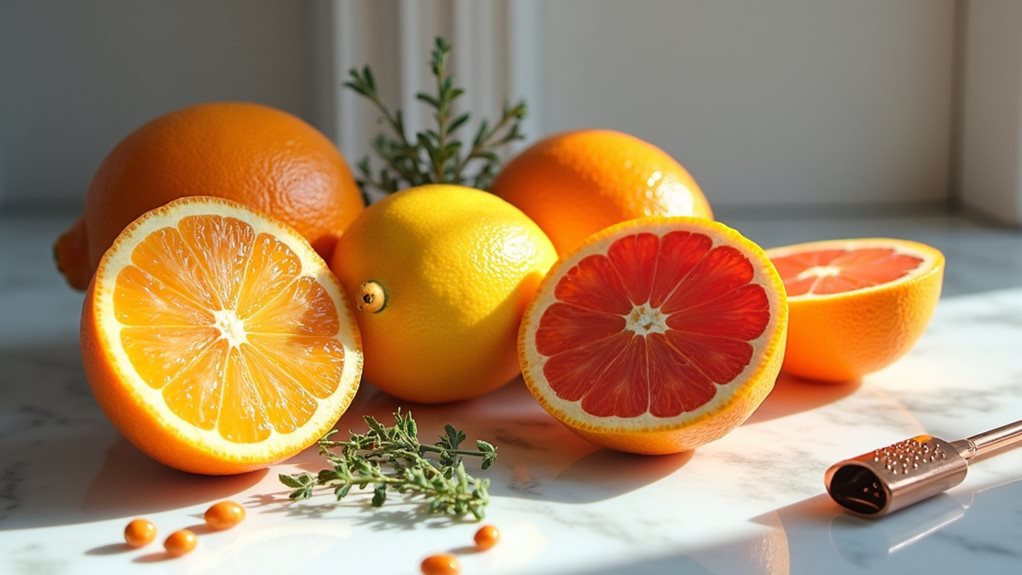
Pairing bergamot with other citrus fruits creates a symphony of flavors that enhances its distinctive profile while tempering its natural bitterness and acidity.
Bergamot dances with its citrus cousins, balancing bitter notes while amplifying the harmony of bright flavors.
Lemon and bergamot share complementary citrus notes, offering bergamot benefits like enhanced aromatic complexity when combined. Grapefruit's similar acidity creates balanced citrus medleys, while milder oranges provide the sweetness needed to counter bergamot's tartness.
For more adventurous pairings, consider yuzu, a Japanese citrus that introduces unique fragrant elements to bergamot-based recipes. Due to the fact that only a small amount is needed, bergamot can be thoughtfully incorporated into citrus blends without overpowering other ingredients. Kumquat offers an interesting sweet-sour contrast that highlights bergamot's distinctive character without overwhelming it. The inclusion of bergamot in jams and preserves creates extraordinary depth of flavor that elevates ordinary fruit spreads to gourmet status.
When creating citrus combinations, remember that bergamot's intensity requires thoughtful proportions—start with a ratio of 1:3 bergamot to milder citrus, adjusting to your taste preferences.
Spice Synergy: Warming Combinations With Bergamot
Beyond the world of citrus, the aromatic profile of bergamot finds its perfect match in warming spices that amplify its distinctive character.
You'll discover that achieving the perfect spice balance with bergamot creates an invigorating sensory experience that's both uplifting and comforting. Traditional blends often incorporate cinnamon leaf, clove, and ginger to complement bergamot's bright notes. Taking time to maintain diffuser cleanliness will ensure you experience the full aromatic benefits of these spice combinations. A professionally crafted blend including frankincense and cardamom can create a particularly luxurious aromatic experience.
For your aromatic adventures, consider these warming combinations:
- Autumn Walk – Combine bergamot with cedarwood and rosemary for an outdoor-inspired blend
- Spiced Cider – Mix bergamot with orange, cinnamon, and lemon for cozy warming notes
- Italian Inspiration – Pair bergamot with rosemary and Mediterranean herbs for a sophisticated twist
These therapeutic combinations don't just smell divine—they can reduce stress and promote overall wellness while creating an inviting atmosphere.
Sweet Meets Citrus: Bergamot and Chocolate Creations
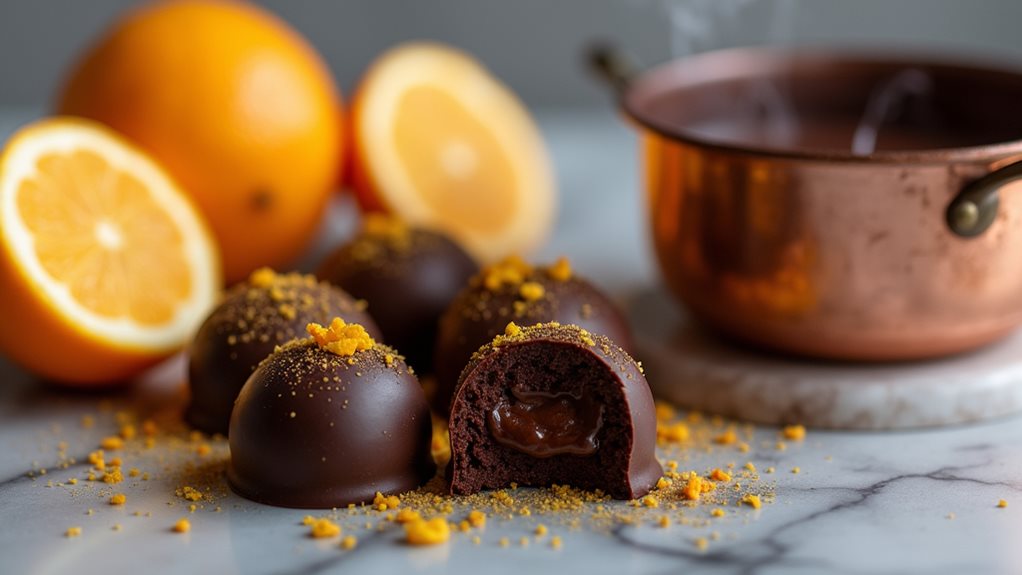
The magical alchemy of bergamot and chocolate creates one of culinary's most compelling flavor partnerships. When you combine bergamot's floral citrus notes with chocolate's earthy depth, you'll discover how the citrus enhances chocolate's sweetness while balancing its bitterness. This relationship is similar to how Earl Grey tea pairs wonderfully with dark chocolate because of the bergamot oil it contains.
This pairing works beautifully across dark, milk, and white varieties.
Try your hand at bergamot brownies, using essential oil or zest in a flourless recipe for a sophisticated twist on this classic dessert. For chocolate truffles, infuse the ganache with bergamot zest to create an aromatic experience that elevates the traditional confection.
The technique isn't unlike using lemon or orange, but bergamot's distinctive profile offers a more nuanced flavor that particularly complements dark chocolate's complexity. Home cooks can experiment with this pairing using high-quality food grade essences without requiring professional culinary expertise.
Unexpected Allies: Savory Applications for Bergamot
While many cooks consider bergamot exclusively for sweets and teas, this versatile citrus transforms savory dishes with its distinct floral-citrus complexity.
Bergamot's floral-citrus profile adds unexpected dimension to savory cooking, challenging its traditional sweet applications.
You'll find its zest and juice can elevate marinades for fish and meats, adding depth without overpowering other ingredients. Try deglazing your pan with bergamot juice after searing protein for unique sauces that balance bitterness with savory notes.
Here's how to incorporate bergamot in savory creations:
- Combine bergamot zest with herbs like rosemary and thyme for a Mediterranean-inspired rub.
- Add a splash of juice to risotto during the final stages of cooking.
- Create savory desserts by infusing bergamot into custards paired with sea salt and olive oil.
The key lies in balancing bergamot's intensity with complementary flavors like ginger or cardamom. Similar to the way seasonal ingredients enhance savory bread puddings, bergamot can introduce bright, complex notes to traditionally rich dishes.
Mixology Magic: Bergamot in Cocktails and Beverages
You'll find bergamot's bright, aromatic qualities create remarkable synergies with spirits like gin, vodka, and bourbon, offering layered complexity that elevates classic cocktails beyond their traditional profiles.
For alcohol-free options, bergamot infusions can transform everyday mocktails into sophisticated beverages that rival their spirited counterparts in depth and nuance.
Whether in homemade syrups, fresh juice, or premium liqueurs like Italicus, bergamot's versatility makes it an essential ingredient for both professional mixologists and home bartenders seeking to expand their flavor repertoire.
Spirit Synergies
Discovering bergamot's role in cocktails reveals an extraordinary dimension of this citrus fruit's versatility beyond traditional uses.
When pairing spirits with bergamot, you'll find that certain combinations elevate both elements to create truly memorable bergamot cocktails. Citrus-forward gins provide an ideal canvas, while sparkling wines cut through bergamot's natural bitterness for balanced spritzes.
Try these powerful bergamot pairings:
- Italicus liqueur with prosecco and a grapefruit twist for a contemporary spritz that showcases bergamot's floral character
- Earl Grey-infused gin with lemon juice and lavender syrup for a sophisticated sour that layers complementary botanicals
- Campari and bergamot bitters with soda water for a complex aperitivo that balances bitter and citrus notes
Modern Mocktail Infusions
As bergamot continues to captivate mixologists beyond alcoholic creations, non-alcoholic beverages offer an exciting canvas for this versatile citrus.
You'll find bergamot's distinctive profile shines particularly well in tea-based mocktails, where its citrus and floral notes perfectly complement Earl Grey's character.
For invigorating summer options, try the Clementina Dream, which pairs bergamot with Sanpellegrino for an effervescent Italian-inspired treat.
Experiment with bergamot pairings like honey and lemon in the Green Gold mocktail, or explore mocktail variations featuring mint leaves for enhanced vibrancy.
When balancing your creation, remember that simple syrups help temper bergamot's natural tartness.
For visual appeal and aromatic complexity, garnish with sprigs of rosemary or star anise.
Serve over crushed ice in chilled glasses for the ultimate revitalizing experience.
Frequently Asked Questions
Is Bergamot Oil Safe for Consumption in All Quantities?
No, bergamot oil isn't safe in all quantities. You'll need to follow consumption guidelines carefully – use only a few drops when cooking. Bergamot oil safety concerns include phototoxicity and potential drug interactions.
Can Bergamot Be Grown Successfully Outside of Calabria?
Yes, you can grow bergamot outside Calabria, but you'll need to replicate its specific climate requirements. Success demands innovation in recreating Mediterranean conditions—temperature stability, mineral-rich soil, and proper moisture distribution for ideal bergamot cultivation.
How Does Bergamot Interact With Dairy Products?
Over 90% of bergamot's polyphenols remain active in dairy mixes. You'll find bergamot pairs beautifully with dairy, enhancing creamy bergamot desserts with its citrus notes and creating distinctive bergamot cheese varieties with unexpected complexity.
What Are Bergamot's Potential Health Benefits Beyond Cardiovascular Support?
Beyond heart health, you'll benefit from bergamot's immune support properties through its antioxidants, and it works as a digestive aid. It also potentially enhances cognitive function, reduces stress, improves skin health, and supports hair growth.
Are There Sustainable Alternatives to Traditional Bergamot Cultivation?
Like a greener path through citrus orchards, you'll find sustainable alternatives in organic farming methods, water-saving irrigation systems, and eco-friendly practices that minimize chemical use while encouraging biodiversity in your bergamot cultivation operations.
Final Thoughts
As you've explored bergamot's versatile nature, you've discovered its ability to dance with companions from tea to chocolate, spices to spirits. Beyond its citrus family ties, bergamot brings a certain sunshine to unexpected culinary territories. Whether you're enhancing your morning cuppa or crafting evening cocktails, this fragrant friend offers endless creative possibilities. Let your culinary intuition guide you—bergamot's distinctive character might just become your secret ingredient for culinary excellence.

